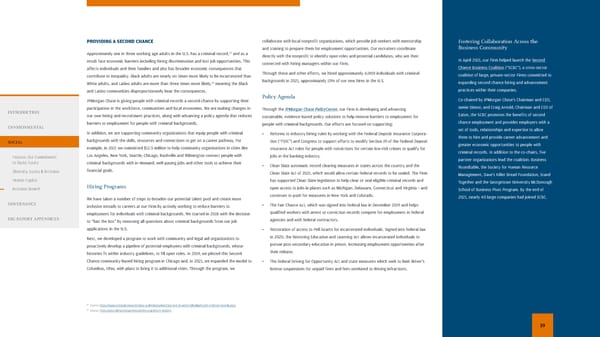Fostering Collaboration Across the Business Community In April 2021, our Firm helped launch the Second Chance Business Coalition ("SCBC"), a cross-sector coalition of large, private-sector Firms committed to expanding second chance hiring and advancement practices within their companies. Co-chaired by JPMorgan Chase’s Chairman and CEO, Jamie Dimon, and Craig Arnold, Chairman and CEO of Eaton, the SCBC promotes the benefits of second chance employment and provides employers with a set of tools, relationships and expertise to allow them to hire and provide career advancement and greater economic opportunities to people with criminal records. In addition to the co-chairs, five partner organizations lead the coalition: Business Roundtable, the Society for Human Resource Management, Dave’s Killer Bread Foundation, Stand Together and the Georgetown University McDonough School of Business Pivot Program. By the end of 2021, nearly 40 large companies had joined SCBC. PROVIDING A SECOND CHANCE Approximately one in three working age adults in the U.S. has a criminal record, and as a result face economic barriers including hiring discrimination and lost job opportunities. This affects individuals and their families and also has broader economic consequences that contribute to inequality. Black adults are nearly six times more likely to be incarcerated than White adults, and Latino adults are more than three times more likely, meaning the Black and Latino communities disproportionately bear the consequences. 24 23 JPMorgan Chase is giving people with criminal records a second chance by supporting their participation in the workforce, communities and local economies. We are making changes in our own hiring and recruitment practices, along with advancing a policy agenda that reduces barriers to employment for people with criminal backgrounds. In addition, we are supporting community organizations that equip people with criminal backgrounds with the skills, resources and connections to get on a career pathway. For example, in 2021 we committed $12.5 million to help community organizations in cities like Los Angeles, New York, Seattle, Chicago, Nashville and Wilmington connect people with criminal backgrounds with in-demand, well-paying jobs and other tools to achieve their financial goals. Hiring Programs We have taken a number of steps to broaden our potential talent pool and create more inclusive inroads to careers at our Firm by actively working to reduce barriers to employment for individuals with criminal backgrounds. We started in 2018 with the decision to “ban the box” by removing all questions about criminal backgrounds from our job applications in the U.S. Next, we developed a program to work with community and legal aid organizations to proactively develop a pipeline of potential employees with criminal backgrounds, whose histories fit within industry guidelines, to fill open roles. In 2019, we piloted this Second Chance community-based hiring program in Chicago and, in 2021, we expanded the model to Columbus, Ohio, with plans to bring it to additional cities. Through the program, we collaborate with local nonprofit organizations, which provide job seekers with mentorship and training to prepare them for employment opportunities. Our recruiters coordinate directly with the nonprofit to identify open roles and potential candidates, who are then connected with hiring managers within our Firm. Through these and other efforts, we hired approximately 4,000 individuals with criminal backgrounds in 2021, approximately 10% of our new hires in the U.S. Policy Agenda Through the JPMorgan Chase Policy Center , our Firm is developing and advancing sustainable, evidence-based policy solutions to help remove barriers to employment for people with criminal backgrounds. Our efforts are focused on supporting: • Reforms to industry hiring rules by working with the Federal Deposit Insurance Corpora - tion ("FDIC") and Congress to support efforts to modify Section 19 of the Federal Deposit Insurance Act rules for people with convictions for certain low-risk crimes to qualify for jobs in the banking industry. • Clean Slate automatic record clearing measures in states across the country and the Clean Slate Act of 2021, which would allow certain federal records to be sealed. The Firm has supported Clean Slate legislation to help clear or seal eligible criminal records and open access to jobs in places such as Michigan, Delaware, Connecticut and Virginia – and continues to push for measures in New York and Colorado. • The Fair Chance Act, which was signed into federal law in December 2019 and helps qualified workers with arrest or conviction records compete for employment in federal agencies and with federal contractors. • Restoration of access to Pell Grants for incarcerated individuals. Signed into federal law in 2020, the Restoring Education and Learning Act allows incarcerated individuals to pursue post-secondary education in prison, increasing employment opportunities after their release. • The federal Driving for Opportunity Act and state measures which seek to limit driver’s license suspensions for unpaid fines and fees unrelated to driving infractions. 23 Source: https://www.ncsl.org/research/labor-and-employment/barriers-to-work-individuals-with-criminal-records.aspx 24 Source: https://secondchancebusinesscoalition.org/why-it-matters 39 INTRODUCTION ENVIRONMENTAL SOCIAL Feature: Our Commitment to Racial Equity Diversity, Equity & Inclusion Human Capital Inclusive Growth GOVERNANCE ESG REPORT APPENDICES
 JPMorgan Chase & Co ESG Report Page 40 Page 42
JPMorgan Chase & Co ESG Report Page 40 Page 42